Star Trek is an old franchise. Star Trek originated in the sixties, man. Do you think Gene Roddenberry was a kind man? He was a wise man? He had plans? He had wisdom?
Probably no to all four. He was a womanizing TV producer who somehow hit upon the perfect sci-fi concept. When Star Trek originally ran, the format for episodic TV was etched in stone. Characters show up somewhere, adventure ensues, crisis averted, everything resets, ready for next week!
The advantages to this format are obvious and made perfect sense back then in the days before VCRs and Netflix. I mean, syndication made the show into what it is today. The “miss-one-episode-and-you’re-lost” structure adopted by DS9 just wouldn’t have flown in the early 70’s.
By the time TNG rolled around, things had changed dramatically on the TV scene. Shows like Hill St. Blues and St. Elsewhere had pushed the serialized drama to the forefront of small screen entertainment. Hell, even the original Battlestar Galactica, a show the writers of TNG are obviously obsessed with, had a hand in shifting things towards serialized storytelling.
So it was no surprise when TNG started to string continuing narratives into the plotting of the show. This happened right from the start, on an almost subliminal level. Gradually, as the series progressed and found its groove, the writers became emboldened to try more elaborate serialized character arcs and loooong, drawn out plots that eventually helped TNG find its own voice and define Star Trek for a new generation.
Viewers today tend to have no idea how radical a step this was at the time. Supposedly, the writers had to fight tooth and nail to incorporate the first serialized stories into the series. Gene Roddenberry famously hated “Family,” for example, which is an episode I consider to be one of the finest the show ever produced.
In time, the “real-world” aesthetic introduced to the show helped make TNG a smash hit. By the time Deep Lame 9 creeped onto the scene, serialized plots had become such a familiar norm that almost the entire run of DS9 is just one big continued narrative. When watched back-to-back, the whole Dominion war thing is actually quite watchable (even though it’s not Star Trek). Most people would agree this was the only way to salvage the show, which had been an unmitigated disaster for the first few seasons.
When it comes to Star Trek: TNG, however, fans are often divided. Some call it “successful and compelling serialization.” Others would call it “gag-barf soap opera.” As always, the truth lies somewhere in the middle.
To explore this fascinating dichotomy further, I – Fergus the Justifier – have taken it upon myself to evaluate and rank the most prominent and important continuity-generating narratives in Star Trek: The Next Generation. Much of this undertaking was excruciating and painful, taking my soul to dark places I had long ago sworn never to revisit.
So you’re welcome.
Arise! Journey with me now to the past – and the future!
Od’s blood!
20. Picard Hates Children
In the very early days of the series, the writers worked very hard to set up and establish Picard as a very demanding, gruff and humourless man who respects protocol and a stiff upper lip above all else. Obviously you wouldn’t be able to sustain such a performance over the course of an entire series, but whatever.
The opposite of such a man must be a child. Therefore, they reasoned, Picard would have a real problem being around kids. And guess what, ho ho? The Enterprise has kids on it! Lots of ’em!
Oh the situations we will have! And always outside the holodeck for some reason!
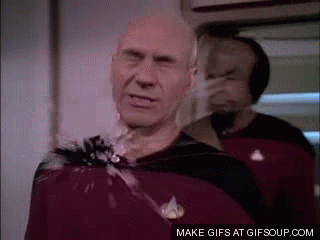
Anyway, IMO Patrick Stewart’s early performances never really managed to quite capture the gruffness the writers had in mind – the whole “grumpy/stern” thing just felt stiff and forced, probably because too much of Stewart’s natural warmth kept shining through.
Although the harsher aspects of this character trait mostly evaporated, they kept up this “awkward around kids” motif whenever it suited the story – episodes like “Suddenly Human” and “Disaster,” in particular, helped keep Picard’s discomfort with kids alive as a continuing narrative arc (this awkwardness conveniently disappeared when it came to his nephew in “Family”). And so a toss-away “show-bible” character trait got elevated to a minor bit of show continuity.
Boring and ultimately pointless. Nevertheless, this was perhaps the first instance of sort-of-planned, serialized plotting in TNG.
19. Invasion!
Another example of the show’s earliest forays into overarching continuity and probably one most everybody remembers. The writers had foreshadowed upcoming events and characters before, such as alluding to the Ferengi (boy, were we surprised when we finally saw those idiots) and the return of the Romulans. But it was “Coming of Age” and “Conspiracy” that truly tested the waters for a more serialized format.
Basically a dry run for the Borg, we are given some strange and twitchy Starfleet shenanigans in “Coming of Age” before it is later revealed in “Conspiracy” that the Federation has been overrun by Geiger-clone space weevils.
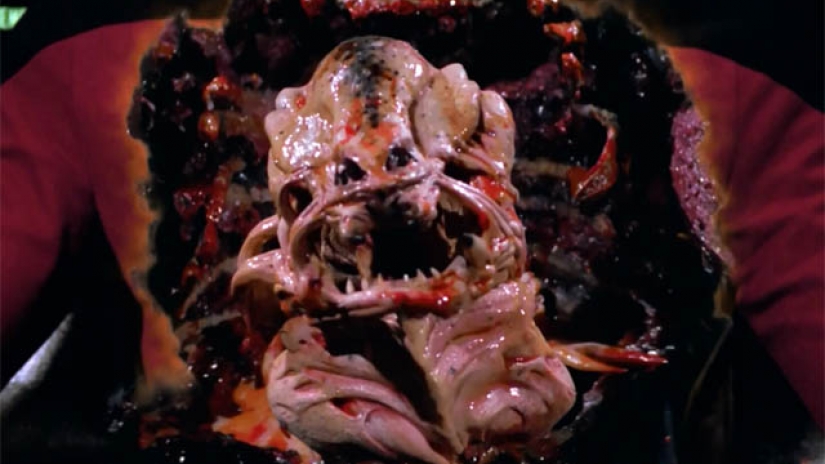
At the time, this episode was considered shocking for its violence and gore factor (now it is considered shocking for many different reasons, like bad effects, bad acting, low budget etc.).
But just like Discovery today with their ridiculous f-bombs, the writers of the TNG really wanted to showcase their freedom from the traditional network censors. From Memory Alpha:
Indeed, the whole idea of the episode, its violence, and its unresolved ending caused quite a stir, but Robert Justman, Rick Berman, and Rob Lewin backed Tormé against the objections of Maurice Hurley, and the show stood pretty much as he had intended it, with the topical references subtly shoved under the carpet. Things did not go so well for writer Tormé in the future; he was left with the feeling that, as far as creative freedom for writers, the second half of Star Trek: The Next Generation‘s second season was the best part of the series as a whole.
Well, that’s your opinion.
Still, the “self-contained” storyline mould of the TOS was effectively cracked with this little venture, paving the way for future, full-on soap opera writing. So while it was a pioneering effort, the invasion arc is just too short and silly to land anywhere but the bottom of this list.
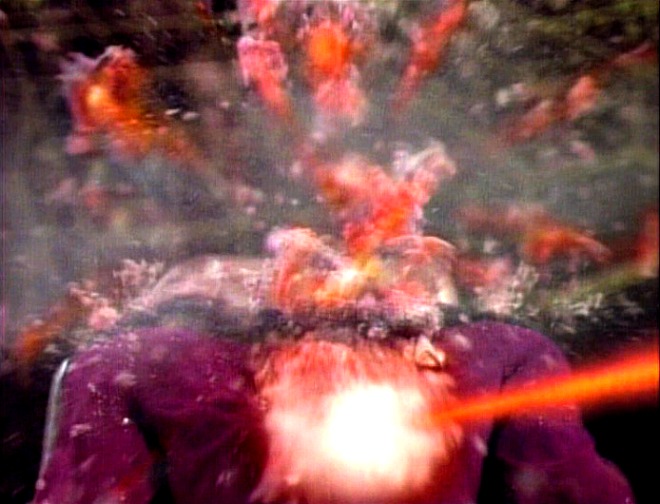
And that’s that. Or…is it? I really hope these crazy critters show up on Discovery. Just like everything else from Star Trek’s history.
18. Deanna’s Mom
Nepotism! Blatant! Horrifying! Ooooooooooooh. So painful…
Deanna’s mom is space-nails on a space-chalkboard. If Majel Barret had never been married to Roddenberry, there would never have been a Lwaxana Troi. And therefore we would never have had to endure the space-cirque episode “Cost of Living.” Soap opera madness to the extreme. You thought Harry Mudd was an irritating, over the top, flamboyant character?
Troi’s mother (I hate typing Lwaxana) is basically just a glorified recurring character, like Mudd. However: she brings with her several continued motifs that established yet another serialized narrative on the show. Her pursuit of Picard, her driving her daughter crazy, her constantly using the ship for personal reasons, her butting into Worf’s life etc. etc.
You have to admit, as terrible as she is, the writers had serious balls introducing an obnoxious and cliched “mother-in-law” type figure into what was once a rollicking space adventure series. Or they were just really, really stupid. Anyway, Troi’s mother unequivocally equals soap opera, and unfortunately her bizarre presence had a substantial effect on the series – for better or for worse (worse).
I’m sure the series regulars, already having to fight for screen-time, loved having Mrs. Troi-centric episodes. The show was basically The Hunger Games when it came to securing airtime for your character.
Another strange and misguided serialized narrative choice edict from the early days of TNG. One that regrettably carried on and plagued us forever. BUH. ARF.
17. Guinan’s Mysterious…Gah, I’m Bored Already
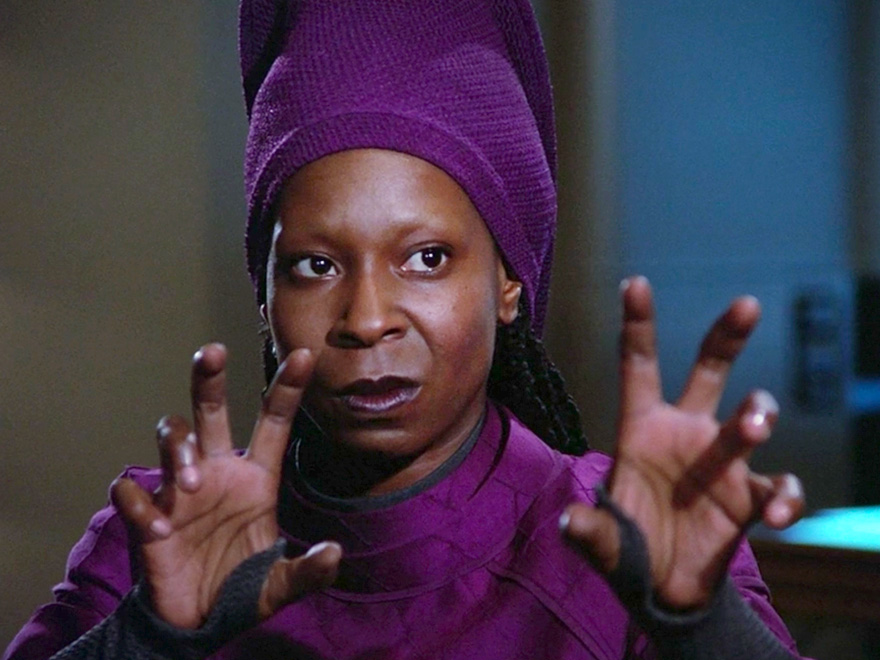
Guinan just plain sucks. What a horrible, horrible bit of stunt casting that seriously went awry. As if the show didn’t already have too many principles to deal with, most of whom were one half of a full character anyway – Picard/Riker, Worf/Yar, Crusher/Troi – they had to further complicate things and divide Troi’s character as well.
So now we have a doctor, a counselor and a bartender all vying for the “wisdom of the ages I’m secretly helping you but you don’t realize it” scenes – which most of the time went to the “all-knowledgable” Guinan.
Given that the women cast members were already fighting for screen time, Gates and Marina must have been so ecstatic when Whoopi Goldberg came barging in like the Kool-Aid Man, demanding a role.
The real problem with Guinan was that they had no idea what they were doing with her. They created this character on Whoopi’s say-so and set up all of this mystery and all of this intrigue but then never paid any of it off – because they clearly had no idea what that mystery entailed or who or what she was.
I mean, look at that photo above. What the f**k is she doing? Alien space-claw-magic defense? Was she at one point supposed to be capable of taking on a Q?! I guarantee they had no idea and still don’t. My guess is they were originally ripping off the Watcher from Marvel Comics.
Over time they sort of settled on all that stupid “listener” crap, but the super annoying, hella-protracted “did he ever tell you why we are so close?” stuff between her and Picard just got stupider and stupider. So boring…
….
Je**s, I just fell asleep typing that last sentence! Did they try and answer the question in “Time’s Arrow?” F**k if I know!
But they insisted on dragging out the mystery of mysterious Guinan’s mysterious nature throughout the entire series, and even into the stupid movies, adding to the show’s soap opera vibe and annoying the hell out of everyone. Whoopi-f**kin’ do!
16. Wesley’s Arc
Man, it is just so painful to write about Wesley Crusher. Hate hate hate. How such a character could have been conceived, let alone actually filmed, is just beyond belief. The only thing that makes sense is a giant, epic troll on Star Trek fandom. As if the first season wasn’t bad enough already.
The reason for the character: unnecessary. The writing of the character: annoying and nauseating. The casting of the character: maddening.
I won’t go into how stiff, weird and insanely terrible Wil Weaton is in the role, or how bad his twinky wardrobe is (rainbows and lower back elfen flippy flaps?!), or how much myself and everyone else on Earth wanted Wesley to die in a highly localized, time-looped coolant leak disaster that flayed his flesh from his bones eternally over-and-over for all time.
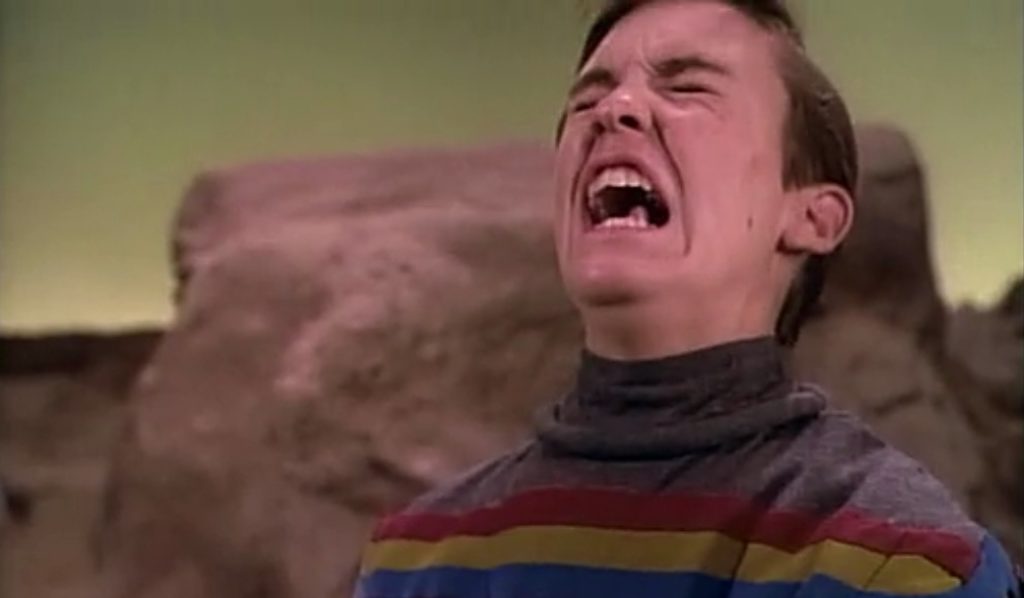
But I digress… Ahem. Wesley was supposed to show us what it was like to be a gifted young man on the cusp of a career in Starfleet. As we saw in “Lower Decks” – literally one of the last episodes of the entire series – the writers didn’t figure out how to properly depict this until the show was over. The character could have worked if he was 1) believable 2) not super annoying 3) already an ensign and not a whiny teenager and 4) not played by Wil Wheaton.
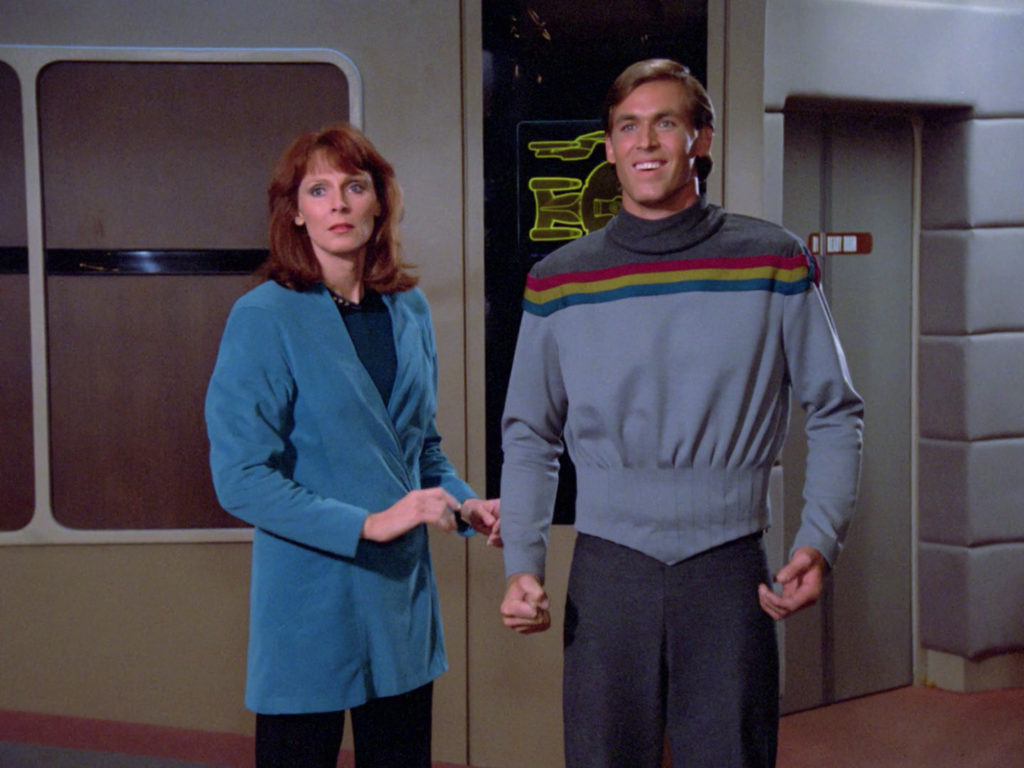
Over and over the writers kept trying to mash this square peg character into their round peg show, turning out laughable crap like “Coming of Age” in a vain attempt to make any of Wesley’s story interesting. Who knew that getting into Starfleet involved theatre of the absurd and horrible psychological cruelty? Stupid.
Wesley trying to get into Starfleet and his eventual field promotion was one of the first serialized bits on TNG – baked into the first few seasons from the very start by none other than Gene Roddenberry himself. And it’s still the worst.
Roddenberry created the idiot kid and the idiot writers did try to salvage the character, in one idiot episode after another. But nothing worked and everyone still hated Wesley (mainly because of Wheaton, but ssshhhh, let’s just keep saying it was the writing).
Okay, so that whole “Starfleet” angle didn’t work. But Wheaton is still contracted to be on the show and Gene likes him. Now what? Well, in “Where No Man Has Gone Before,” they decide to establish that Wesley is a “Space Mozart” when it comes to warps and stuff. This is why no one else but Wesley is ever able to save the ship – he’s the goddamn “Chosen One of the Galaxy!” Ah, ok.
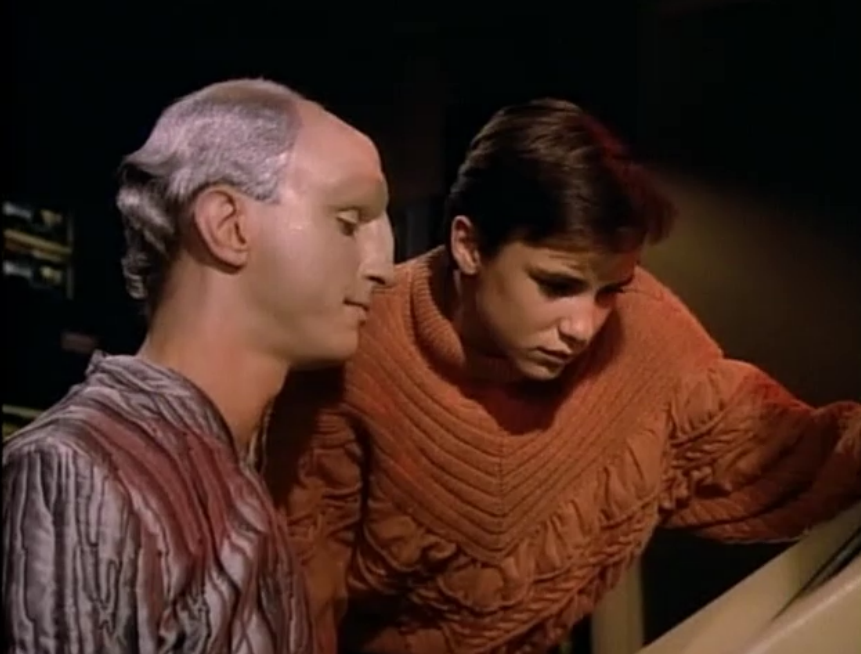
Finally everyone hated Wesley so much – including Weaton – that they just booted him off of the show. Finally! But they still couldn’t leave it alone! Wesley kept coming back and coming back (he was gone! you were free! WTF?!) until eventually the writers decided to try and redeem the character by paying off that half-baked arc they dreamed up back in the first season. Ronald D. Moore willingly accepts the blame:
“I was the one who pushed to get Wesley out of the Academy and send him off with the Traveler. I felt that there was a built-in contradiction in a character that we’d said was like Mozart in his appreciation of higher mathematics and physics, yet was just on the same career path as any Starfleet cadet. I didn’t get it – if Wes is truly special and gifted, what the hell is he doing at the Helm? It seemed like he was only going to the Academy to live up to the memory of his father and the expectations of Picard, not because it was his best destiny. “Journey’s End” also seemed like an opportunity to see someone walk away from Starfleet with their head held high and just say “It’s cool, but not for me.” I was tired of everyone in the 24th century saying, “All I want to do is wear the uniform and serve on a starship.” Hey, it’s cool, but it’s not for everyone. So I pushed to have Wes realize his destiny was elsewhere and have him walk away.”
Barf! “This character totally sucks and we keep making it worse, but hey, it’s cool.” God, he keeps calling him “Wes!” Double barf! I may need to lie down…
And so, in a blaze of EPIC WRITING, in a story that took place on the planet of the racist tropes, they made Wesley…a Time Lord. Like, literally able to jump around the cosmos like a Time Lord without even needing any kind of vessel or assist. Ok perfect. Ships like the Enterprise are so passé. Hey “Wes,” say hi to Apollo and Q for us.
“Dress warmly on those other planes of existence”
- Beverly Crusher
I really wish Ronald D. Moore had ran with this amazing serialized story arc and continued Wes’s adventures as a full-fledged series, Star Trek: Wesley. It couldn’t be any worse than Discovery.
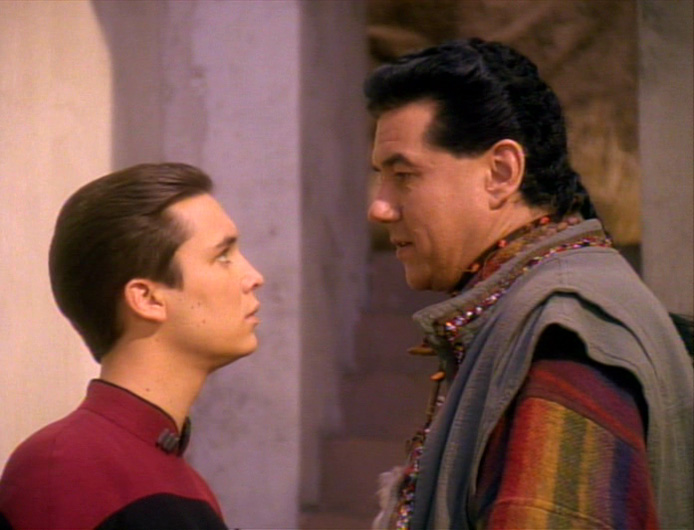
The best part of Wesley’s cosmic space odyssey character arc? He’s shown at Riker and Troi’s wedding just hanging out in uniform again, no big deal, just havin’ some cake and what not. Isn’t he supposed to be a goddamned Time Lord now?!
And in a truly godawful and appalling Nemesis deleted scene, it’s revealed that Galactic-Space-Demi-God Wesley has recently been posted to the USS Titan’s Engineering department…on the night shift. A bit of a step down from time-traveling “Cosmic Mozart,” but whatever makes ya happy.
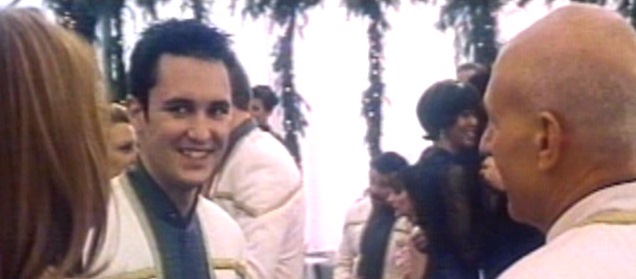
(I can’t stop watching that deleted scene! So f**king horrible! The temp-stock music, the low-rent set dec, the concussed acting. His creepy chipmunk smile. Hypnotic. And is his hair dyed?)
So basically nothing about this stupid character makes any damn sense but because he was endlessly shoved down our throats I have no choice but to include him and his stupid serialized arc on this list. Unfortunately for us all, Wesley Crusher is a blight upon the series that will gnaw at our collective consciousness for the rest of our goddamn lives. Researchers of the far future will have to endure his aggravating presence until the technology exists to completely recast and re-write him. Trekkie/Trekker film revisionists of the future – I salute you!
The one thing to take away from all of this is that Wil Wheaton is an extraordinarily bad actor.
15. Vash/Reisa
Can you say “soap?” Can you say “opera?” Put them together and what do you get? Really weird shit like this Picard-Vash romance.
Star Trek lore says that in the third season Patrick Stewart got really bored and wanted more action – in every sense of the word. So enter Vash and a kooky Bogie/Bacall dynamic that saw Picard afflicted with space-pants-camel toe and the audience scratching their heads.
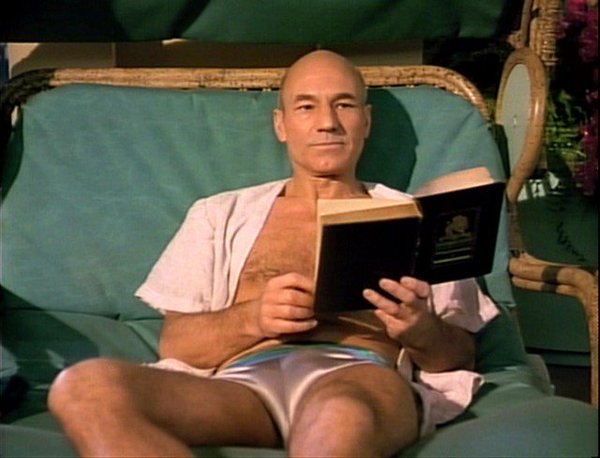
But you couldn’t deny the two had chemistry – probably because they were apparently a real couple at the time. Look at this picture. No duh.
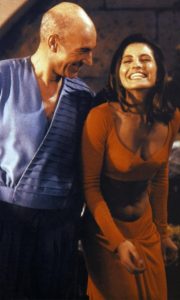
I remember hearing rumours that Piller wanted Picard and Vash to marry in season four, as a way to shake things up and create some new dynamics. Supposedly the higher ups killed the idea, but my guess is that Stewart whispered “Ix-nay-on-the-girlfriend-regular-cast-member-tay.”
Regardless, Vash appeared again in “Q-pid” (ugh, that title), introducing some much needed romantic and comedic tension. Their first encounter is referenced and alluded to extensively as Picard struggles with both his embarrassment and his gigantic blue balls, instantly creating another minor serialized arc. One that the writers never resolved. “Our gift to you, fan fiction nerds!”
Vash’s re-appearance gives us many interesting character moments with the crew, further creates a sense of real-life continuity and allows Stewart to play a different side of the captain. A minor arc, but an effective one that took TNG to whole new narrative worlds (“I never said they’d be places you wanted to go!”).
As a result of this whole Vash thing, the planet Reisa also became its own little motif. Horga’hns and hot pants, baby.
14. Keiko/O’brien
I placed this one ahead of the Vash angle because, although quite minor, seeing a married couple serving together aboard the Enterprise did indeed add a whole new “everyday life aboard a starship” dynamic to the show. We had seen couples and kids before, but Keiko and O’brien shoved the concept right in our face, creating yet another bit of serialized continuity for TNG. And, IMO, a greater impact on the soap opera scale.
Kooky courtships and weddings? Baby delivery during a space disaster – by Worf no less? Like dilithium through the warp core, so are the days of our lives…
The marriage had some other dramatic benfits on the show as well. When Keiko and their baby are threatened by a space-ghost-possessed O’brien, the fact that they are married really ups the creepy. That’ll be a great story to tell the kid when she’s older.
This cute little sub-plot supposedly arose out of Piller’s desire to marry Vash and Picard. I guess I wouldn’t go so far as to say this continuing drama lessened the show in any way, but would I rather spend more time watching the crew regulars face some sort of dangerous sci-fi menace?
Duh-UH.
13. Riker’s Own Command
Why doesn’t Riker have his own command? Why doesn’t Riker have his own command? Why doesn’t Riker have his own command? Why doesn’t Riker have his own command?
There is no logical answer.
Y’know, if the show itself had never brought it up they might have been able to just ignore this baffling question. But of course they couldn’t just leave the elephant be – because they could feel the illogic burning them like napalm – and this recurring motif was the result.
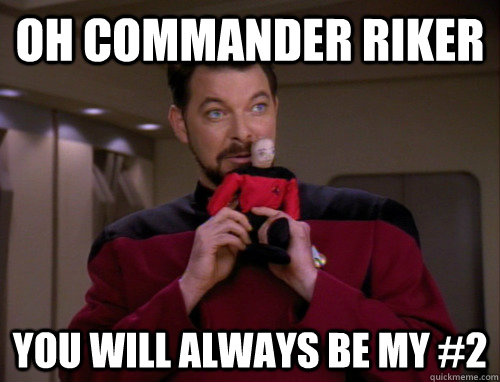
Why doesn’t Riker want to “sit down” in the big chair? We are both told and shown he is a great leader and tactician. We hear that Starfleet has offered him his own command several times. So what gives?
The real reason, of course, is “because TV.” But the whole “I’m just so damn comfortable here aboard this Galaxy-class Love Boat” excuse was so completely goddamned stupid and lame and contrary to the character that it makes me gag just to think of it (they pushed this conceit so hard as to actually have the Admiral Riker of the future still commanding the now obsolete Enterprise in “All Good Things”).
An attempt to acknowledge this lapse in narrative logic, the writers just ended up making said lapse all the more weird and noticeable. A snake eating its own tail. Or “tale” as it were!
Morons. Anyway, they tried to explain things away and the longer this went on, the more it became its own serialized bit of continuity.
Dig this:
RIKER: What am I still doing here? Deanna, I pushed myself hard to get this far. I sacrificed a lot. I always said I wanted my own command, and yet something’s holding me back. Is it wrong for me to want to stay?
TROI: What do you think?
RIKER: Maybe I’m just afraid of the big chair.
TROI: I don’t think so.
RIKER: The Captain says Shelby reminds him of the way I used to be. And he’s right. She comes in here full of drive and ambition. Impatient, taking risks. I look at her and I wonder whatever happened to those things in me? I liked those things about me. I’ve lost something.
TROI: You mean you’re older, more experienced. A little more seasoned.
RIKER: Seasoned. That’s a horrible thing to say to a man.
TROI: I don’t think you’ve lost a thing, and I think you’ve gained more than you realise. You’re much more comfortable with yourself than you used to be.
RIKER: Maybe that’s the problem. I’m too comfortable here.
TROI: I’m not sure I know what that means. You’re happy here. Happier than I’ve ever known you to be. So, it comes down to a simple question. What do you want, Will Riker?
What are you “still doing here,” Commander? You’re still first officer because the show has nowhere for you to go and the script says so, that’s why. I hate it when I can feel the writing in a show. This little exchange is nice and all, but it runs completely contrary to the WIll RIker we were first introduced to.
Clearly, this is nothing more than writers trying to paint themselves out of a corner. You can’t have a successful, Kirk-aged career-officer character on the show if its going to run more than three seasons. A decade later and he was still first officer – right up to the last movie!
That’s the inherent design flaw in the cloning of TMP‘s Decker – the whole thing underscores how unnecessary and misguided it was to split Captain Kirk into two characters in the first place.
Ultimately, despite being one of the most popular characters, Riker just became completely redundant. Picard became John Mcclane anyway, because no matter how hard you try to fight it, that’s the DNA of the show. This recurring narrative motif was an attempt at fooling us into not noticing. FAIL. But I will admit, it did give “The Best of Both Worlds” a heavy kick of dramatic tension.
Shelby really sticks it to Riker and it’s because everyone knows that Riker should just f**k off and go be a captain already. Also – we know she’s right in everything she says. And so does Riker. We cringe slightly because the writers are at least brave enough to have Riker be on the losing end of this exchange. Every one of his excuse-retorts just sound so lame. Because they are so lame! There is no logical justification for Riker turning down a promotion to a command of his own.
Of course this is just a great set up for the end of the episode, but here at least this narrative arc really pays off and the success of this exchange helped define not just the episode but the entire series. The reason this continuing sub-plot scores as high as it does is for moments like this. If you can manage to forget just how illogical Riker’s quandary is, then the resulting tension did work to the show’s benefit.
One strange side effect of all of this? Riker’s inner turmoil heavily influenced the characterization of Thomas Riker, whose own character arc spun out of the question of OG Riker’s lost ambitions. Spilling over into Deep Sh*t Nine, the continuing story of Riker’s infamous duplicate proved that Star Trek is one seriously incestuous franchise.
Serializations begetting serializations. How perverse.
12. Picard/Crusher
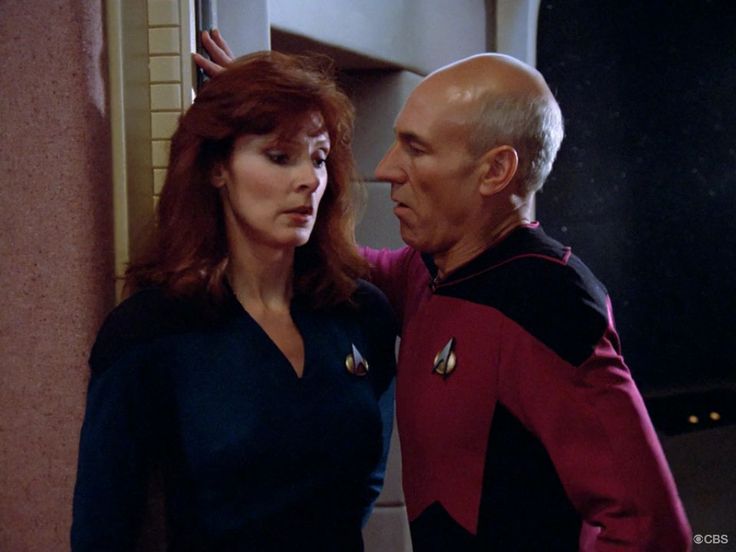
So who out there wanted to see Picard and Crusher get together and be a couple? Not seeing many hands up out there. Yeah, me neither.
This little arc was set up from the start and somehow, miraculously, made it right to the bitter end. We find out in “All Good Things” that in a possible future they do in fact end up married. So it’s almost like a minor book-end for the entire series. Of course, we learn they also got divorced. Bummer.
This bit of serialization is actually borderline – more backstory than arc. But their feelings for each other factored into enough of the show’s plots that it actually ends up scoring pretty high on the list.
All of the quasi-romantic tension formed a nice steady undercurrent of drama over the course of the show and all of their morning brunches added further dramatic friction and subtext to any new relationships that came along. Of all the soap opera-y stuff they added into the show, this was the most overt. They might as well have been meeting Samantha and Charlotte at a Starbucks.
Of course, the one where they’re mind-tethered finally brought everything out into the open. The writers, however, were only willing to take the serialization of Star Trek so far. So of course they immediately don’t get together after learning they are in love with each other. Why? Because TV.
11. Data’s Origins/Extended Family
If TNG has one, glaring, inexcusable and truly terrible recurring narrative, then it must be the lazy-writing retch-fest that constitutes Data’s ridiculous extended “family.” Once the door to Data having other android brethren was opened, the writers promptly lost their collective minds and happily regurgitated this concept whenever they ran out of ideas for the next episode. That deadline crunch is brutal!
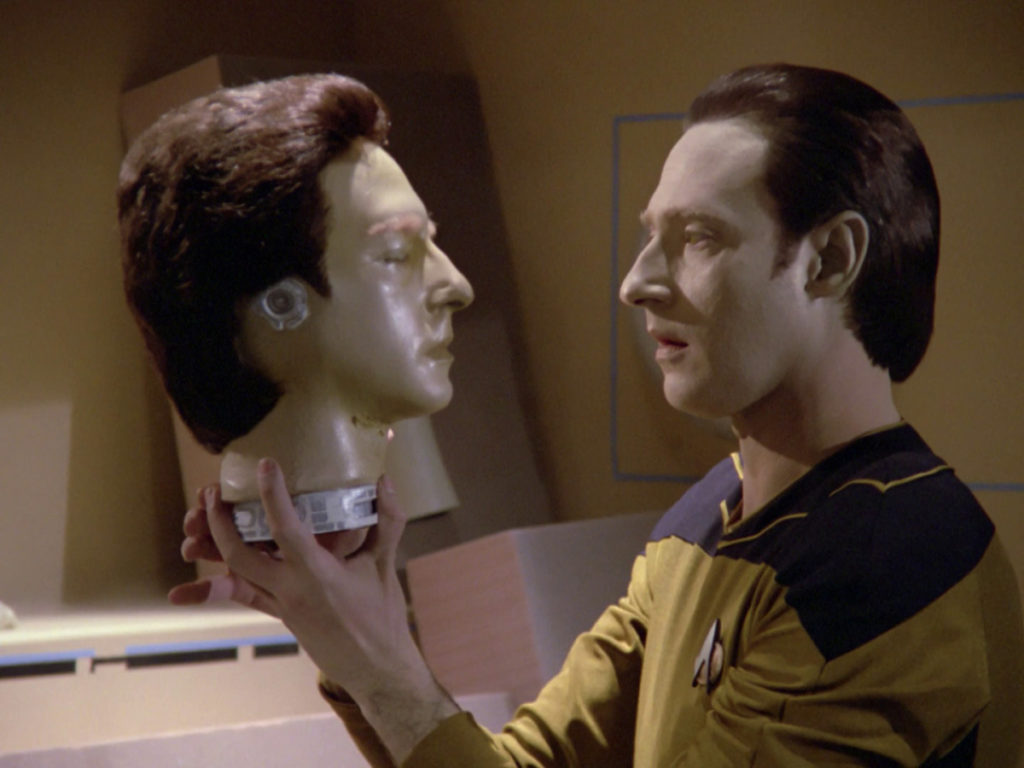
At least part of the blame for this overused and idiotic plot device can be placed at the feet of Gene Roddenberry himself – he helped plant the seed for Data’s endless family tree by writing the entirely dreadful “Datalore.”
In this wretched and hopelessly sh*tty episode, the crew of the Enterprise discover a duplicate of Data – “Lore” – a synthetic “brother” incapable of either subtlety of performance or logic. Many laughable shenanigans occur as Lore goes mental before being thwarted by who else but Wesley f**king Crusher. The real villain here is – unsurprisingly – Brent Spiner.
-
Lore was originally planned to be a female android to provide a love interest for Data. Her job would have been to go out and repair dangerous situations. It was Brent Spiner who suggested the old “evil twin” concept be used instead. (Star Trek: The Next Generation Companion 2nd ed., p. 46) The female android concept was later used in the third season episode “The Offspring“. However, the female android depicted there was Data’s offspring, and not a love interest.
What a f**king surprise. It just got worse, or course, with Spiner at one point playing three separate roles on screen at the same time. What power did Spiner have over the writers? What sort of carnal bribery did he put on offer? And why would he even want this? Like, is it just plain narcissism? Do actors on a series get more money for playing another role? I imagine they do. Questioned answered.
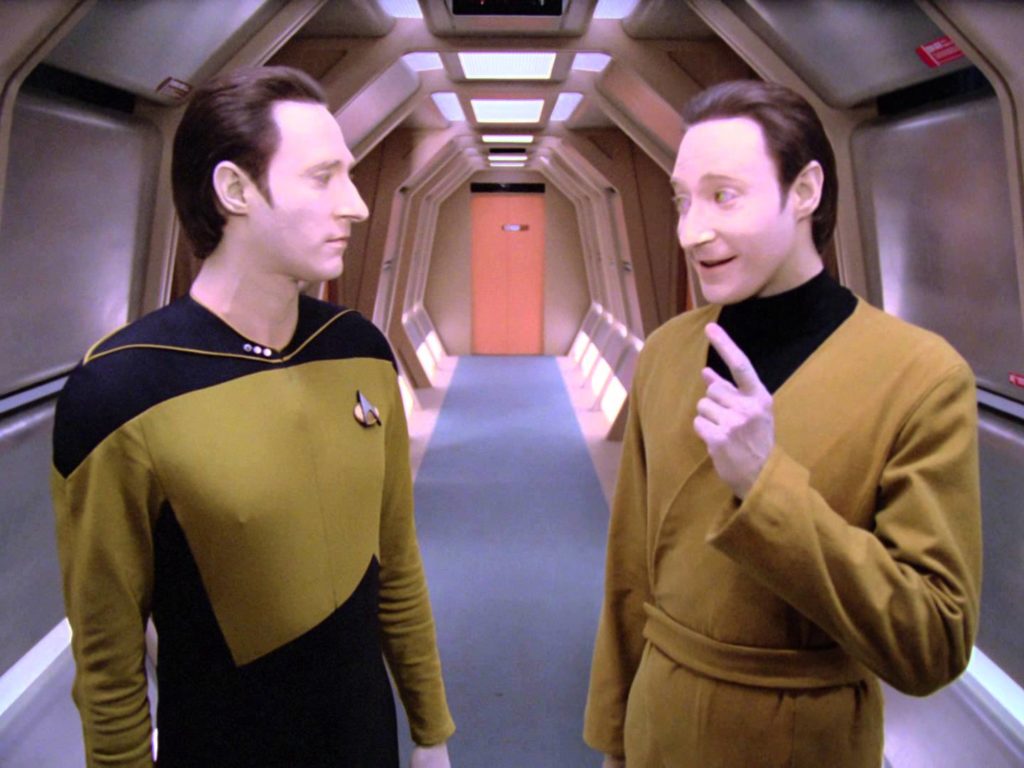
I’m actually shocked they never tried an episode where they go through a black hole and every character becomes Spiner.
So let’s see…Data gets a “brother,” a “dad,” a “daughter,” a “mother” and…another “brother,” because if an idea gets you out of a brainstorming jam once, it will certainly do so 5 more times. “Hey, Brent’s really putting on a tour-de-force of acting here! The fans love it. Let’s keep this going!” Eeee-dee-ots.
Michael Pillar, discussing “Brothers:”
Once Data goes back to see Dr. Soong, it’s basically a chat and without some jeopardy or another event to go on I was afraid it was going to be flat. We talked about what we could do and, ultimately, the obvious thing was that we bring Lore back. I knew from the moment we came up with it that Brent Spiner in three roles was going to make for an unforgettable episode and I think it was.” (Captains’ Logs: The Unauthorized Complete Trek Voyages)
Careful, Icarus.
By no means a horrible episode, “Brothers” still nevertheless induces mass vomiting whenever Spiner/Soong appears on screen. It’s like watching a really bad one-man show at a small-town community centre.
Why didn’t they just cast an age-appropriate asian actor? Why?! What the hell is this obsession with Spiner’s scenery chewing? At least they cast a different actor to play Data’s “daughter,” Lal.
(God, I’m so sick of having to put quotes around all of Data’s familial connections.)
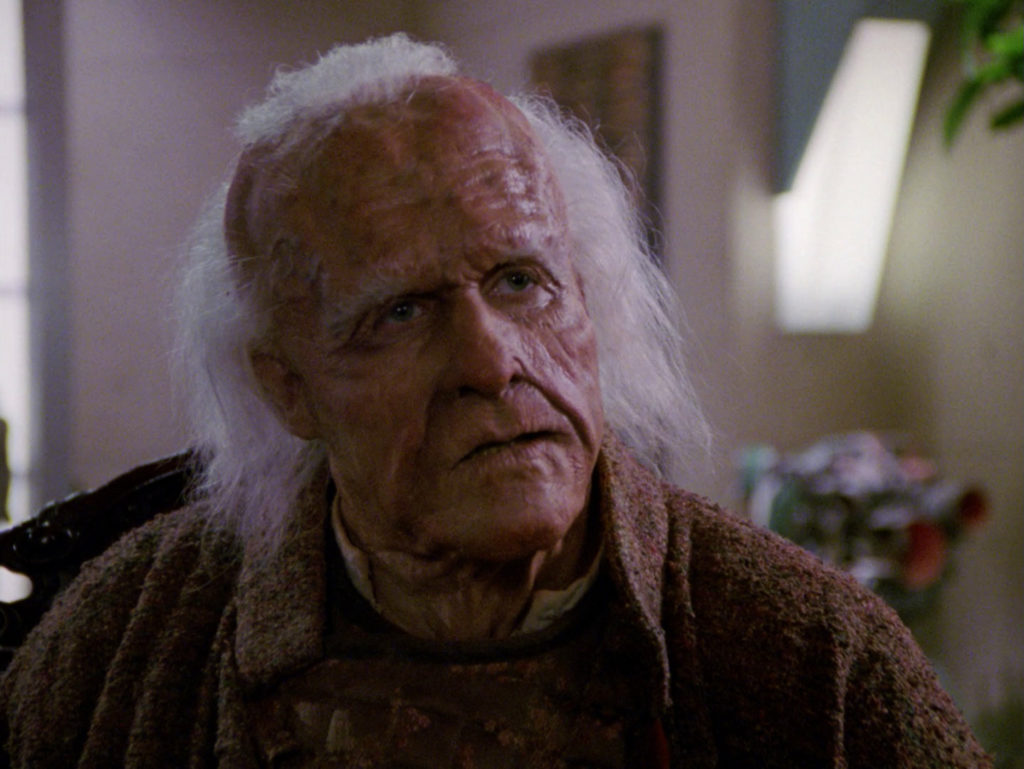
Data’s convoluted origins and his crazy “family” truly smashed down the gates leading straight into Soap Opera Land. Spiner’s greedy machinations ended up heavily influencing the plots of many more Data-centric episodes, shaping the direction and mythos of the series in a pretty big way.
I think most would agree that Lore hooking up with the Borg was the straw that broke the sehlat’s back. Of course that didn’t stop the writers. Oh, no no no. And of course, we also got the whole “continuing saga of the crystalline entity” as a bonus, further smashing the non-serialized mould of TOS.
Unfortunately for us all, however, this pandora’s box would remain wide open for the duration of both the TV series and the ensuing movies.
••••••••••••••••••••••••••••••
Well, I sincerely hope you enjoyed this warp down memory lane. Join us for part II where we will finish our countdown – hopefully with our sanity still intact.
Until then, STAY VIGILANT, BY CROM!
![]()
I AM FERGUS THE JUSTIFIER!

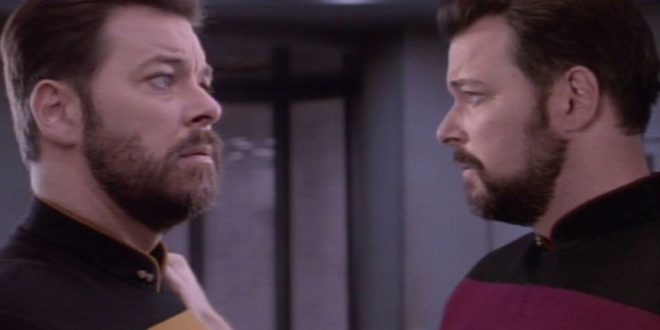
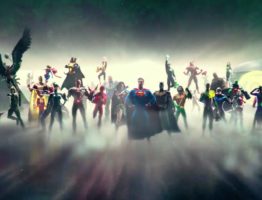

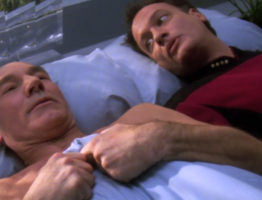
Rate on, rate on. Alright alright alright. Cant wait for part 2.